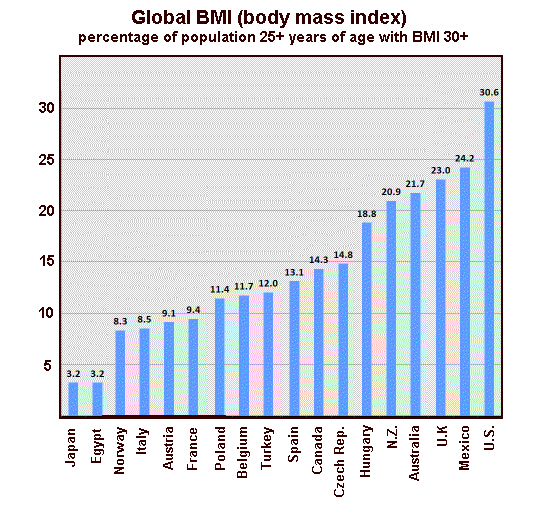Food For Thought
May 9, 2009 Frequent contributor Michael Goodfellow and I have been exchanging media stories on the causes of obesity for many months. In general, Michael is of the view that what's changed is not so much the American diet (never all that great) but the decline in activity over the past 100 years as people moved from heavy, hard farmwork to factories to cubicles. While I would agree exercise/work/burning calories is certainly a macro-factor, I also find the evidence that packaged food is being engineered to trigger our reward-centers (yum, sugar, fat, salt, gimme more!) persuasive. It seems self-evident that larger portions also are a causal factor in the explosive rise of obesity in the U.S. (Please see The End of Overeating: Taking Control of the Insatiable American Appetite.) Michael recently sent in these two links, and this tongue-in-cheek comment: Eat Quickly, for the Economy’s Sake (NY Times) The point being that correlation is not necessarily causation. Meanwhile, self-evident factors in the nation's tremendous weight gain in just the past decade include: 1. Paucity of nutrition and cooking-real-food education in public education 2. Reduction/degradation in physical education as a "marginal" or "extra" subject (rather than one absolutely central to a healthy life) 3. Increasing portions in restaurants and fast food outlets 4. Time pressure on working parents (microwave packaged food rather than cook) 5. Explosive growth of computers, electronic games, etc. which offer children an alternative to active play 6. Staggering success of fast food marketing 7. Stupendous success of fat-laden, salty, sugar-bomb "snacks" and other packaged foods/beverages Or this one, modified to be slightly more truthful: 8. The infernal growth of cooking shows on cable TV which lead not to more cooking but to more inactive TV-watching and so on. What seems to be missing in discussions of the causes of weight gain and obesity is an integrated approach. An "eat your vegetables" approach does not do justice to the multi-billion-dollar marketing campaigns behind fast food and packaged food/snacks/ empty-calorie "sports" drinks, empty-calorie juices, empty-calorie sodas, etc. nor do they consider the abysmal state of education on the nutrition/health/cooking matrix in the nation. The Chinese expression is "disease comes through the mouth," meaning disease comes from what we eat. While this is obviously a simplification, that a poor diet leads to disease is irrefutable. It seems self-evident to me that any discussion of healthcare costs must be integrated with a discussion on the causes of obesity, the unhealthy ingredients in most fast/packaged food and the poor state of knowledge of basic nutrition and food preparation. If we can agree that adult life is a series of trade-offs, then perhaps we can move to an understanding that either we restrict the foods we eat when we have a choice, or our diet will eventually be restricted by chronic diseases. Clearly, diet is only half the equation. Micro-managing one's diet while remaining inactive is still a recipe for poor health. The human body was selected for an omnivorous diet and a life of constant movement; to hope that we can deprive it of natural foods and exercise and somehow maintain health is fantasy. I certainly don't have an answer to this complex situation, but a recognition that marketing of horrendously unhealthy fast foods, snack and packaged food (all that salt guarantees high blood pressure, you can be sure of that), poor nutritional/food prep education, gutted physical education programs and skyrocketing healthcare costs are indeed causally related would be a start. We might also pursue research not on correlations but more directly causal links.Michael Goodfellow offered these possibilities for testable results: If there's a similar pathway for food, it could easily be fooled by a modern diet, which is much richer than what we would have eaten in the wild. If you consume over a long enough period, perhaps the body reacts properly to the rich diet (as if you were eating fat off a killed animal in the wild). But if you are consuming refined sugar quickly, the body can't evaluate the food quickly enough to raise the "you're full" flag before you've eaten too much. Of course, this doesn't answer the question of why you wouldn't just go longer between meals if you had overeaten. But it still does strike me as completely testable in a lab. Just sit people down, force them to eat faster, and see if they average a higher calorie intake than the controls. Another theory, that people are more stressed now, could also be tested. Give people uppers and see if they eat more. Thank you, Michael. Here are a few recent books and films of interest on the subject: The Omnivore's Dilemma: A Natural History of Four Meals I bet if Romeo and Juliet Of Two Minds reader forum (hosted offsite, reader moderated) Thank you, Michael M. ($5), for your very generous contribution to this site. I am greatly honored by your support and readership.
The conflicting studies on diet, obesity and health tend to obscure obvious connections between exercise/activity, the food industry, education, obesity, health and rising health costs.If eating quickly makes you fat (on average), but also richer (on average), which do you pick?
Fast Food, Fat Food:Catherine Rampell at Economix posts this interesting chart showing the relationship between the "time the average person in a given country spends eating and that country’s obesity rate (as measured by the percentage of the national population with a body mass index higher than 30)."


It seems to me that the idea that fast eating causes overeating is testable. The theory behind it is that your body has some signaling mechanism to tell you when you have eaten enough. This can't simply be a full stomach. If it were, people would consume pastry in the same quantities as beef. We have to be evaluating the richness of the food somehow. There's a comparable idea for thirst -- you can't possibly be alleviating the thirst during the time you drink. So your body must have some way of estimating how much water you need, before the effects ever reach the bloodstream.

In Readers Journal: Thought-provoking New essay by Zeus Y.
Tortured Democracy (Zeus Y.) "Good faith" may have limited application in contract law, but it has no place in constitutional law. If you flout the highest law of the land, especially if you are a top-level decision-maker, you should be brought to justice. If you provably condoned, approved, and justified torture against established national and international law, you should be prosecuted.
And a darned clever new poem by Mike Dakota:IF ROMEO AND JULIET
had a phone they would have text'd
and their early demise not met
or let
two families suffer regret
full of tears salty and wet
and William's plot made thinner yet.
Our previous list of hot reading (check them out at your local library if you don't want to own a copy) can be found at Books and Films.
What's for dinner at your house? has been updated with a new recipe: Eggplant Parmesan . This a mouthwatering photo-illustrated PDF from longtime contributor Bill Murath.



























